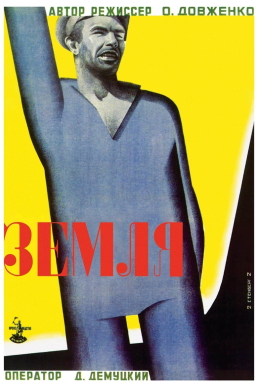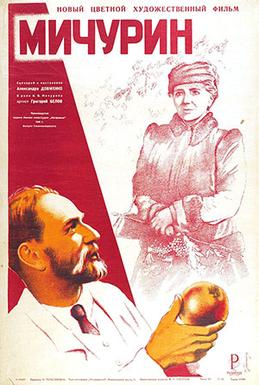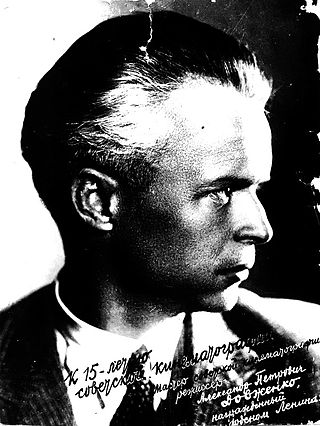
Earth is a 1930 Soviet silent film by Ukrainian director Oleksandr Dovzhenko. The film concerns the process of collectivization and the hostility of kulak landowners under the First Five-Year Plan. It is the third film, with Zvenigora and Arsenal, of Dovzhenko's "Ukraine Trilogy".
Ivan is a 1932 Soviet drama film directed by Aleksandr Dovzhenko. After the critical lambasting of his film Earth by the Soviet authorities, Dovzhenko returned with a more popular iteration of its main motifs. Much like Earth, Ivan concerns itself with the natural rhythms of country life, disrupted by the beat of looming industrialisation.

Shchors is a 1939 Soviet biopic film directed by Oleksandr Dovzhenko and Yuliya Solntseva. Commissioned by Joseph Stalin, the film is a biography of the partisan leader and Ukrainian Bolshevik Nikolai Shchors. Shchors is played by Yevgeny Samoylov (1912–2006).
The Dovzhenko Film Studios is a former Soviet film production studio in Ukraine that was named after the Soviet film producer, Oleksandr Dovzhenko, in 1957. With the fall of the Soviet Union, the studio became a property of the government of Ukraine. In 2000, the film studio was awarded national status.

Ukrainian cinema comprises the art of film and creative movies made within the nation of Ukraine and also by Ukrainian film makers abroad.
Igor Andreyevich Savchenko or Ihor Andriyovych Savchenko was a screenwriter and film director, often cited as one of the great early Soviet filmmakers, alongside Sergei Eisenstein, Vsevolod Pudovkin and Aleksandr Dovzhenko. He is also known for teaching Sergei Parajanov at the Russian film school VGIK, also attended by Parajanov's best friend Mikhail Vartanov.

Odesa Film Studio is a Ukrainian, formerly Soviet, film studio in Odesa. Founded in 1919, it was one of the first studios in the Russian Empire and the Soviet Union.

Michurin is a 1948 Soviet film directed by Oleksandr Dovzhenko about the life of Russian practitioner of selection Ivan Michurin. The film is based on Dovzhenko's play Life in Bloom, which was also the title used for the film in its 1949 American release by Artkino Pictures.

Alexander Petrovich Dovzhenko, also Oleksandr Petrovych Dovzhenko, was a Ukrainian Soviet director, film producer and screenwriter. He is often cited as one of the most important early Soviet filmmakers, alongside Sergei Eisenstein, Dziga Vertov, and Vsevolod Pudovkin, as well as being a pioneer of Soviet montage theory.

Mute Nights Ukrainian: Німі ночі) or Festival of Silent Film and Contemporary Music, is an annual film festival, which takes place in Odesa, Ukraine the third weekend of June,. organized by Ivan and Yuriy Lypa Charitable Foundation and State Film Agency of Ukraine. The festival's debut opening ceremonies were held at the Korobchinsky Art Center on June 18, 2010.
The Enchanted Desna is a 1964 Soviet fantasy drama film, directed by Yuliya Solntseva, based on an autobiographical story by a Ukrainian national writer and cinematographer Oleksandr Dovzhenko. The story depicts his whimsical childhood experiences in a Ukrainian village near the banks of river Desna.

Oleksandr Dovzhenko Hlukhiv National Pedagogical University is a university in Hlukhiv, Ukraine. The university was founded in 1874 as a teachers institute. It was awarded the status of pedagogical university in 2001. Hlukhiv University is an integral part of the educational system of Ukraine. It is the educational establishment of the European type with powerful and effective education system, known and famous. Based on the best pedagogical traditions it follows the time demands giving profound education and training to the young generation. In more than 100 years of history of the university different social, political and economic changes in the society were reflected. It currently has three faculties and about 5,000 students.
The All-Ukrainian Photo Cinema Administration was a cinematographic state monopoly that united the entire film industry in Ukraine (1922–1930). VUFKU was vertically integrated: it controlled production, distribution, and exhibition of films.

The Diplomatic Pouch is a 1927 Soviet silent thriller film directed by Oleksandr Dovzhenko. The first two parts of the film are lost.
Ivan Petrovych Kavaleridze was a Ukrainian - Soviet sculptor, filmmaker, film director, playwright and screenwriter.
A Spring for the Thirsty, sometimes translated into English as A Well for the Thirsty, is a Soviet surrealist film completed in 1965 but not released until 1987. The Dovzhenko Film Studios production was the directorial debut for Yuri Ilyenko, from a script written by Ivan Drach. Due to censorship from the Communist Party of Ukraine, the premiere of the film was delayed for 22 years until the implementation of perestroika. A Spring for the Thirsty has been called among the most significant early films of the Ukrainian poetic cinema movement, and in 2021 it was named the 21st best Ukrainian film ever by the National Oleksandr Dovzhenko Film Centre.

Prometheus is a 1936 Soviet war film directed by Ivan Kavaleridze. The film is an adaptation of the 1845 poem The Caucasus by Taras Shevchenko. At the centre of the development of Ukrainian cinema during the 1930s, the film was banned by Soviet censors shortly after its release for "bourgeois nationalist" themes. Since then, it has grown to be considered one of the greatest Ukrainian films ever made, and it is rated 30th on the Dovzhenko Centre's list of 100 greatest Ukrainian films.










